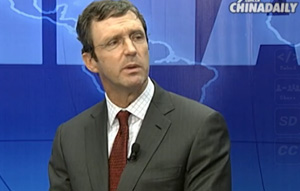Biden's China trip has broad agenda
Updated: 2013-11-28 07:56
By Chen Weihua in Washington (China Daily USA)
|
||||||||
US Vice-President Joseph Biden, who will start his East Asia trip on Sunday, is expected to seek clarification from China about the recently announced air defense identification zone, but White House officials emphasized that the trip has a far broader agenda.
In a background briefing on Wednesday morning, senior administration officials said the visit to China provides an opportunity for Biden to speak directly with Chinese leaders on the issue, to convey US concerns directly and to seek clarity regarding the Chinese intentions in making the move at this time.
China declared last Saturday its East China Sea Air Defense Identification Zone (ADIZ), which overlaps airspace over the Diaoyu Islands that is also claimed by Japan as part of its ADIZ.
In a phone call to his Japanese counterpart Itsunori Onodera on Wednesday, US Secretary of Defense Chuck Hagel described the Chinese announcement as "a potentially destabilizing unilateral action designed to change the status quo in the region, and raises the risk of misunderstanding and miscalculation", according to a Pentagon statement.
On Tuesday, the US flew two unarmed B-52 bombers over the airspace covered by China's latest ADIZ, flights that Pentagon officials described as having been planned for a long time. In return, Chinese Ministry of Defense spokesman Geng Yansheng said on Wednesday that China has observed US B-52 bombers flying in the newly established ADIZ over the East China Sea. The Chinese army monitored the entire process, carried out identification in a timely manner and ascertained the type of aircraft.
"We need to stress that China will identify every aircraft flying in the ADIZ according to the country's announcement of aircraft identification rules for the ADIZ," Geng said, adding that China is capable of exercising effective control of this airspace.
The senior US administration official, however, said Biden is not travelling to Beijing to deliver a demarche, let alone on a single issue. "He's going to have a very high-level and a very wide-ranging dialogue with the senior Chinese leadership that covers a wide range of shared interests along with areas of concern," he said.
Biden will leave on Sunday heading first to Japan, then China and the Republic of Korea. While in China on Dec 4-5, Biden will meet President Xi Jinping, Vice-President Li Yuanchao and Premier Li Keqiang to cover a broad range of bilateral, regional and global issues.
"He will pick up where President Obama and President Xi left off after Sunnylands and the G-20, with the kind of high-level personal engagement between the top leadership of our two countries that is an essential part of advancing the US-China relationship in the 21st century," said the official, referring to the informal summit between Xi and Obama in Sunnylands, California, in early June when they vowed to build a new type of major country relationship to defy the historical rivalry between a rising power and the existing power.
Biden has a closer personal relationship with Xi than any other US leaders. He met Xi during his trip to China two years ago and he also accompanied him during Xi's trip to the US in February, 2012, as China's vice-president.
"So this matters. And I think what you will see is that this relationship enables him to conduct high-level and high-quality dialogue that's particularly valuable today among these three countries," said the official.
Despite the news media hype of potential military tensions between China and the US, the official emphasized that two countries have made good progress between the two militaries since Biden's last visit to China.
"We've had a number of very strong mil-mil programs throughout the year, high-level exchanges, quite a good dialogue," he said.
"And then this military-to-military engagement is a very important part of our overall bilateral relationship and a place where we are seeking to maintain continuous and open dialogue."
In addition, Biden will look for a reaffirmation of the reform agenda rolled out at the recent Third Plenum of the 18th Central Committee of the Communist Party of China.
"We believe that this is an important and an ambitious reform program," the official said.
During the East Asia trip, Biden will stress US commitment to the rebalancing strategy and its enduring role as a Pacific power. "It's important to give lift to our treaty alliances and to advance our important relationship with China," the official said.
Stapleton Roy, a distinguished scholar at the Kissinger Institute on China and the United States at the Wilson Center, said Biden's visit to China is very important.
He said the recent deal regarding Iran's nuclear program will require cooperation and mutual understanding between the US and China. "Tensions in the East China Sea are dangerously high. And both countries are in the early stages of exploring how to create a new model of relations between major countries that can contain and reverse an escalation of strategic rivalry between the United States and China," said Roy, who was US ambassador to China in the early 1990s.
"For all these reasons and many more, it is important for senior leaders on both sides to have regular opportunities such as this to exchange views on domestic and international affairs in a candid and straightforward manner," Roy said.
"The two countries have a common interest in peace and stability in East Asia, but often different approaches because of historic and geographic factors and the dissimilar nature of their relations with countries in the region. Such differences can be reduced and managed more effectively by timely consultations between the two sides," Roy said.
Contact the writers at chenweihua@chinadailyusa.com

 Americans mark Thanksgiving Day with parades
Americans mark Thanksgiving Day with parades
 Dubai Expo may fuel boom, but has risk
Dubai Expo may fuel boom, but has risk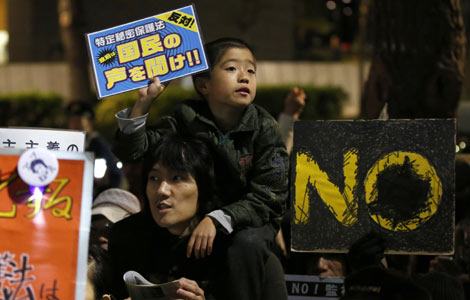
 Tokyo may expand air defense zone
Tokyo may expand air defense zone
 Beijing cuts number of new cars
Beijing cuts number of new cars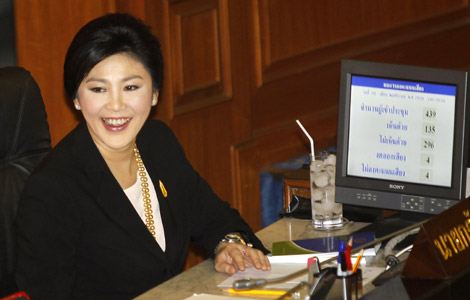
 Embattled Thai PM survives no-confidence vote
Embattled Thai PM survives no-confidence vote
 Christmas market opens in Frankfurt
Christmas market opens in Frankfurt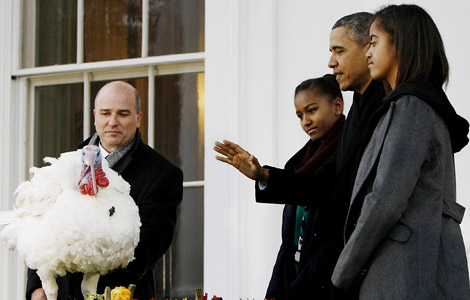
 Obama pardons Thanksgiving turkey
Obama pardons Thanksgiving turkey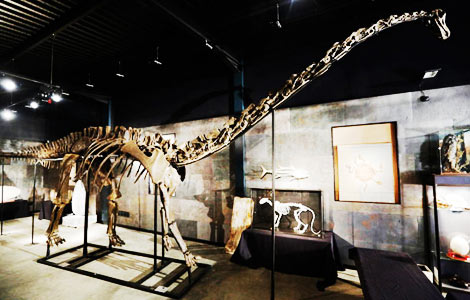
 Rare diplodocus dinosaur sells for $650,000
Rare diplodocus dinosaur sells for $650,000
Most Viewed
Editor's Picks

|

|

|

|

|

|
Today's Top News
DPRK nuclear reactor may be in use again: IAEA
SF auto show dazzles
Air zone 'not aimed at civilian flights'
Pacts to boost economic co-op
Holiday plans stir up complaints
Industrial sector's profits rise in Oct
Traditional TV under besiege
IAEA team continues review of Fukushima plant
US Weekly

|

|

